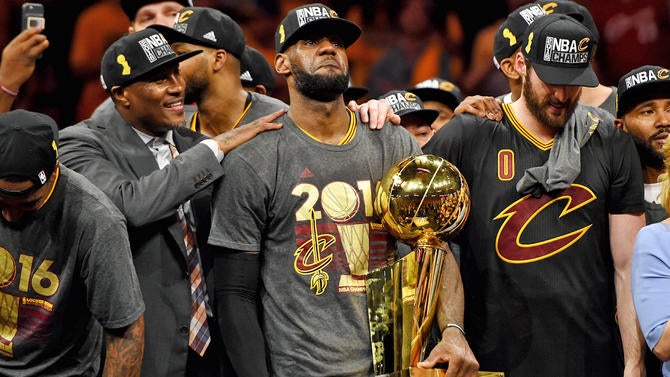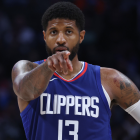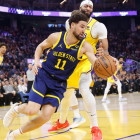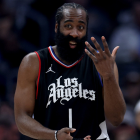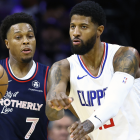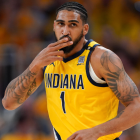It was all there in that moment, as the tears flowed and the most interesting and nuanced person in sports fell to the floor and let it sink in: The Cleveland Cavaliers were champions.
And he, LeBron James, a kid from Akron who took a trying childhood and all the promise his basketball gifts imbued in him and then left, had come back home and raised the place he loved above all others.
He was crying on the floor. Hands over his face. His teammates hugged him on all sides, and their love and outstretched arms might as well been hundreds of thousands of arms reaching to the sky in Ohio, reaching for other Ohioans, taking in 2,465 miles away from Oracle Arena the Cavs' stunning 93-89 NBA Finals Game 7 win.
Their voices, their joy, their celebration a result of LeBron James, who -- after the hate and doubt and divorce -- had returned to his sports-cursed home and done this for them.
LeBron wiped his eyes. All this was crashing down as Doris Burke, for ESPN, came closer for the postgame interview.
"I'm sorry, Doris," Kyrie Irving said, breaking off after his own remarkable Finals -- the 26 points he scored Sunday night, particularly a 3-point shot with 53 seconds that changed everything -- and own part of this incredible moment. For the NBA. For all of us gawking at the astounding nature of it. For Ohio. For that star, still crying, still letting it all wash over him, as he was asked how he felt.
How can a man like LeBron possibly explain that feeling?
Think of all the things wrapped up in that moment: The childhood promise before any of us knew his name. The words "Chosen One" that as just a teenager marked his potential and any failures that would follow. The eager and early start in a league he would dominate. The close calls and brewing bitterness in Cleveland before the much-maligned exit for South Beach. The criticism and praise and mistakes, the misunderstandings, the divide that formed over the very mention of his name. The return because of a real love for a real place that goes mostly disrespected.
All that it means to be LeBron James unraveling after a lifetime aimed at this one thing: Lifting up the people -- his friends, yes, but the strangers, too -- who were there with him and part of him before he ever became a household name.
"I gave everything that I had," he said, and everything was perhaps the greatest individual performance in NBA Finals history. "I brought my heart, my blood, my sweat, my tears to this game. And ... against all odds -- against all odds -- I don't [know] why we want to take the hardest road. I don't [know] why the man above gives me the hardest road. But it's nothing the man above don't put you in situations you can't handle. And I just kept that same positive attitude, like, instead of saying, 'Why me,' I was saying, 'This is what He wanted me to do.' And ..."
This was quintessential LeBron James. Honest, raw, candid, all of it pouring out -- only this time after the greatest basketball moment of a life defined by the sport. He already was the unanimous Finals MVP at this point, collecting 27 points, 11 rebounds, 11 dimes, two steals and three blocks in Game 7.
And what, in this moment, did LeBron James steer toward? What was the most important thing, the emotional thing to come pouring out in his proudest moment?
"CLEVELAND!" he screamed. "This is for you!"
There would be more words later, more celebrations, more explanations of how he led the only successful comeback from a 3-1 deficit in NBA Finals history, how he dismantled the Warriors' claim to greatest NBA team of all time, how he answered his clear annoyance with Steph Curry's unanimous MVP and ascending place in the game with this: 29.7 points, 11.3 rebounds, 8.9 assists, 2.6 steals and 2.3 blocks per game.
There is time later for more to ponder: How LeBron, after this, could be back on track to chase down Michael Jordan as the greatest player of all time. How the Warriors' implosion cost them a similarly important if different share of history. How, love or hate the man, what he did is worthy of not just praise and respect but all-time status at a level still to be determined.
And he told us how and why he and Cavaliers team just mounted this stunning comeback against the most worthy of adversaries: It was the hard road, it was the struggles, that got him here. His mistakes, and ours about him. His struggles, and those we foisted on him -- because it's both. His childhood, surely, and an adulthood under the lights that prepared him to take on the 73-win Warriors team, down 3-1 and ruled out by almost all of us, and turned the impossible into Ohio's greatest sports moment.
We have hated LeBron James. We have loved him. We've called him petulant, we've called him brave, we've lifted him to heights reserved for only our most iconic athletes, and we've torn him back down. We've blamed him for what he deserved and for what he didn't.
Put all that aside, if you can. Because what he did in the NBA Finals -- and the emotion it unleashed in him -- was about more than LeBron James. It was about the state of the league at its best, about human drama on the kind of scale that while rare makes sports a portal to something more meaningful, and it was about a kid few believed in doing the unthinkable for a place similarly discounted by too many of us.
Is LeBron James the best player of all time? Probably not. Maybe. Time will tell.
But he may be the most important person to stay true to Ohio, ever. And that, as we saw as he fell to the floor in joy, is its own kind of rare, lasting greatness.
